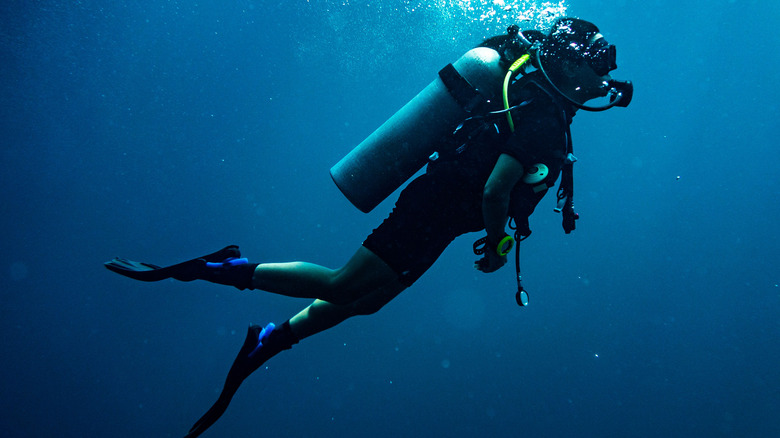What Happens To Your Body When You Scuba Dive
Scuba diving is a great way to explore the ocean floor and interact with sea life, but that doesn't mean there aren't risks involved. As fun and thrilling as scuba diving may be, it can also be quite dangerous. While it doesn't happen to everyone, all scuba and deep-sea divers run the risk of developing decompression sickness (via Drugs.com).
Also known as the bends, decompression sickness occurs when scuba divers ascend to the surface of the ocean too quickly, causing gas bubbles to form in the blood and tissues. This is largely due to rapid changes in water pressure, which causes the nitrogen that scuba divers breathe in to dissolve and form gas bubbles in the body as pressure decreases.
Common symptoms of decompression sickness include headache, dizziness, joint pain, extreme fatigue, difficulty thinking clearly, tingling or numbness, weakness in the arms and legs, and a skin rash. If left untreated, decompression sickness can damage your blood vessels and may even result in death. Fortunately, you can avoid experiencing decompression sickness by ascending to the surface at a steady and even pace.
How to treat decompression sickness
Decompression sickness can be quite serious, so it's important for you or your diving buddy to seek immediate medical attention if you lose consciousness, exhibit signs of paralysis or stroke, or experience chest pain and shortness of breath (via WebMD). If you're not experiencing any life-threatening symptoms, however, you doctor will most likely perform a physical examination and conduct a series of tests. If your case is more severe, you may require recompression therapy.
Recompression therapy is a treatment that involves the use of a hyperbaric chamber — a sealed and pressurized chamber, which delivers pure oxygen to those inside (via Drugs.com). The chamber is used to simulate a deep-sea dive of 30 to 60 feet below sea level, which reduces the size of the gas bubbles in your blood and tissues and restores your normal blood flow. While recompression therapy usually lasts up to 12 hours, it may take longer depending on the severity of the case (via eMedicineHealth).


